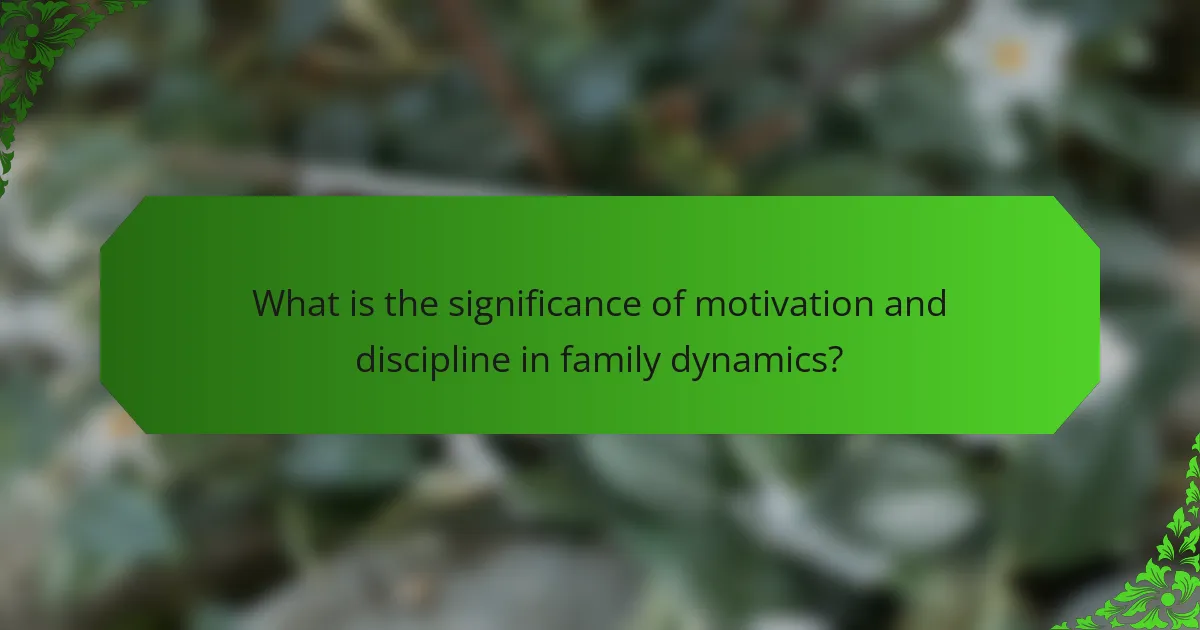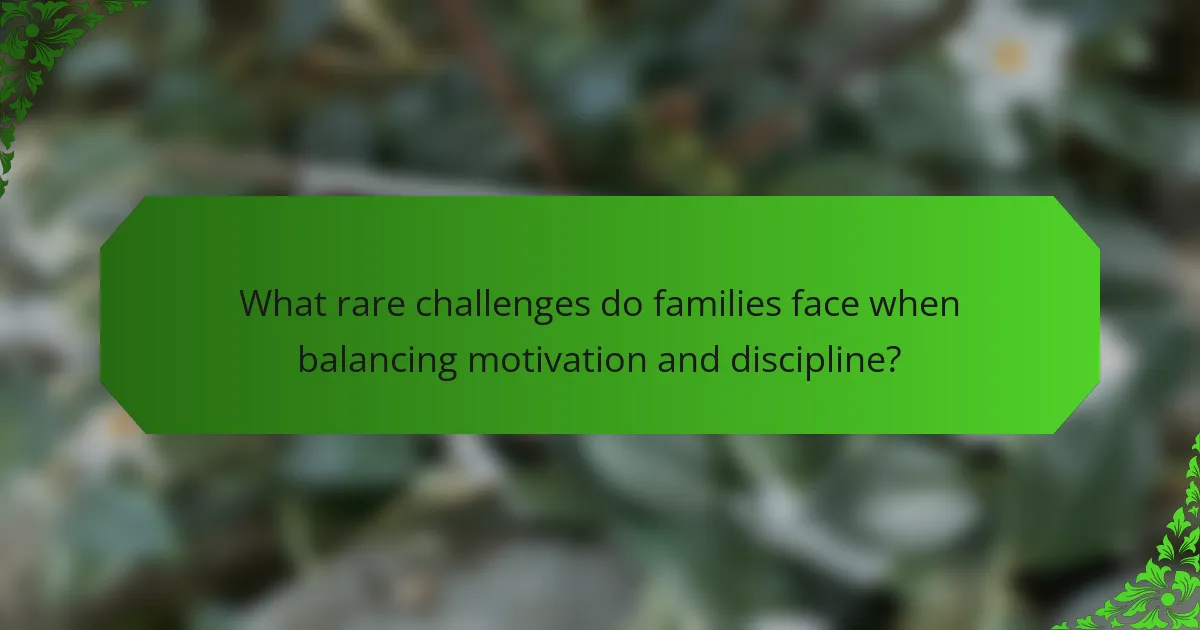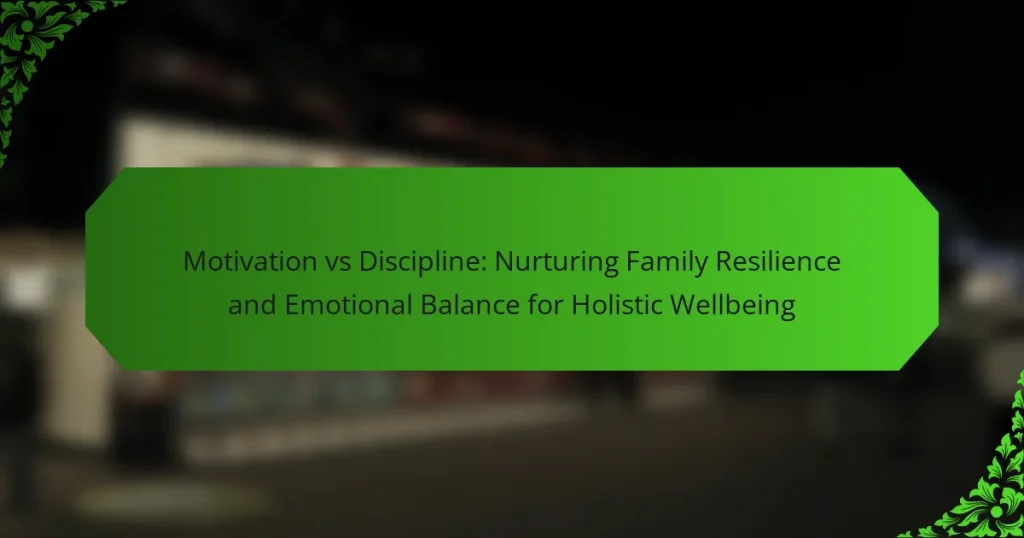Balancing motivation and discipline is essential for fostering family resilience and emotional balance. Motivation drives families toward shared goals, enhancing unity and support. Discipline establishes structure and accountability, promoting healthy routines. Together, they contribute to holistic wellbeing, enabling families to effectively navigate challenges.

What is the significance of motivation and discipline in family dynamics?
Motivation and discipline are crucial for fostering resilience and emotional balance within family dynamics. Motivation drives family members to pursue shared goals, enhancing unity and support. Discipline establishes structure and accountability, promoting healthy behaviours and routines. Together, they create a nurturing environment that contributes to holistic wellbeing, enabling families to navigate challenges effectively.
How do motivation and discipline contribute to family resilience?
Motivation and discipline are essential for fostering family resilience. Motivation provides the drive to overcome challenges, while discipline ensures consistent effort towards goals. Together, they create a supportive environment that promotes emotional balance and holistic wellbeing. Families demonstrating high motivation and discipline are better equipped to navigate stress and adapt to change, reinforcing their resilience. This synergy cultivates stronger relationships and enhances overall family dynamics.
What emotional balance can be achieved through motivation and discipline?
Achieving emotional balance through motivation and discipline fosters resilience. Motivation ignites the drive to pursue goals, while discipline ensures consistent effort. Together, they create a stable emotional environment, enhancing wellbeing. Research shows that individuals with strong motivation and discipline report higher life satisfaction and lower stress levels. This synergy cultivates a proactive mindset, enabling families to navigate challenges effectively.

What are the universal benefits of motivation in families?
Motivation fosters emotional balance and resilience in families, enhancing overall wellbeing. It encourages open communication, strengthens relationships, and promotes a supportive environment. Families with high motivation levels often experience improved mental health outcomes and greater adaptability to challenges. Additionally, motivation can lead to increased goal-setting and achievement, contributing to a sense of purpose and fulfilment within the family unit.
How does motivation impact children’s development?
Motivation significantly influences children’s development by enhancing their emotional balance and resilience. Motivated children are more likely to engage in learning, leading to improved cognitive and social skills. Research indicates that intrinsic motivation fosters a sense of autonomy, which is crucial for holistic wellbeing. As a result, families that nurture motivation create supportive environments that promote emotional stability and resilience.
What role does motivation play in family communication?
Motivation significantly enhances family communication by fostering openness and understanding. When family members are motivated to express their thoughts and feelings, it strengthens emotional bonds and encourages active listening. This dynamic cultivates resilience, as motivated communication enables families to navigate conflicts effectively. As a result, emotional balance is achieved, contributing to holistic wellbeing within the family unit.

What unique attributes differentiate motivation from discipline?
Motivation inspires action through emotional drives, while discipline enforces consistent behaviour regardless of feelings. Motivation is often temporary, influenced by external factors, whereas discipline represents a stable commitment to goals. Unique attributes include motivation’s reliance on personal passion versus discipline’s structured approach to achieving long-term objectives.
How do motivation and discipline influence family routines?
Motivation and discipline significantly shape family routines by fostering resilience and emotional balance. Motivation drives family members to engage actively in routines, while discipline ensures consistency and adherence to these practices. Together, they create a stable environment that promotes holistic wellbeing. For example, a motivated family may prioritise healthy meals, while disciplined habits ensure regular family meals occur. This synergy enhances emotional connections and nurtures a supportive atmosphere, ultimately contributing to overall family health.
What are the psychological effects of motivation versus discipline?
Motivation enhances emotional engagement, while discipline fosters consistency in behaviour. Both are crucial for family resilience and emotional balance. Motivation can spark initial efforts, but discipline sustains long-term commitment. Research indicates that disciplined individuals often experience lower stress levels, contributing to holistic wellbeing. In contrast, motivation can fluctuate, impacting emotional stability. Understanding these dynamics allows families to cultivate an environment that balances both elements for optimal mental health.

What rare challenges do families face when balancing motivation and discipline?
Families often struggle to balance motivation and discipline due to unique challenges like differing parenting styles, external pressures, and communication barriers. These factors can create inconsistency, leading to confusion in children regarding expectations. For example, a parent may prioritise motivation through encouragement, while another emphasises discipline, causing conflicting messages. This rare challenge can hinder emotional balance and resilience, making it essential for families to establish a unified approach. Open dialogue and shared goals can help families navigate these complexities effectively.
How can families overcome resistance to discipline?
Families can overcome resistance to discipline by fostering open communication and understanding. Establishing a supportive environment encourages children to express their feelings about discipline. Consistency in rules and expectations builds trust and helps children internalise the value of discipline. Additionally, involving children in discussions about consequences promotes accountability and ownership of their actions. This approach nurtures resilience and emotional balance, essential for holistic wellbeing.
What uncommon strategies enhance motivation in family settings?
Uncommon strategies to enhance motivation in family settings include fostering open communication, setting collective goals, and creating a culture of gratitude. These approaches build emotional connections and resilience. For example, regular family meetings can encourage participation and shared responsibility. Additionally, recognising individual contributions fosters a sense of belonging and motivation. Implementing creative reward systems can also inspire engagement and commitment among family members.

What practical steps can families take to nurture resilience?
Families can nurture resilience by fostering open communication, setting consistent routines, and encouraging problem-solving skills. Engaging in regular family activities strengthens bonds and promotes emotional balance. Teaching children to manage stress through mindfulness practices enhances their ability to cope with challenges. Additionally, modelling perseverance in the face of adversity instills a growth mindset, empowering family members to navigate life’s difficulties together.
How can families create a balanced environment for emotional wellbeing?
Families can create a balanced environment for emotional wellbeing by fostering both motivation and discipline. Establishing consistent routines helps children feel secure and promotes resilience. Encourage open communication to validate feelings and enhance emotional intelligence. Incorporate regular family activities that promote connection and shared experiences, such as game nights or outdoor adventures. Prioritise self-care practices for all family members, as this nurtures individual wellbeing and strengthens family bonds.
What daily practices support motivation and discipline?
Daily practices that support motivation and discipline include setting clear goals, establishing routines, and practising mindfulness. These strategies enhance family resilience and emotional balance, contributing to holistic wellbeing. Regularly reviewing progress boosts motivation, while consistent discipline fosters a structured environment. Engaging in family activities strengthens bonds and reinforces commitment to shared objectives.
How can families set effective goals together?
Families can set effective goals together by fostering open communication and collaboration. Establish a shared vision that aligns with each member’s values and aspirations. Encourage regular discussions to evaluate progress and adjust goals as needed. Utilise specific, measurable, achievable, relevant, and time-bound (SMART) criteria to enhance clarity and commitment. As a result, families nurture resilience and emotional balance, contributing to holistic wellbeing.
What expert insights can guide families in this journey?
Families can benefit from expert insights by prioritising emotional balance and resilience. Strategies include fostering open communication, setting consistent routines, and encouraging individual strengths. Research indicates that families who practise mindfulness together enhance their emotional wellbeing. Engaging in collaborative problem-solving cultivates discipline while maintaining motivation, ultimately supporting holistic family health.
What common mistakes should families avoid in fostering motivation and discipline?
Families should avoid being overly punitive, neglecting individual needs, and failing to model desired behaviours. Overly punitive approaches can foster resentment rather than motivation. Neglecting individual needs may lead to a lack of engagement and emotional disconnect. Failing to model desired behaviours undermines credibility and trust. Balancing motivation and discipline requires understanding each family member’s unique attributes and fostering a supportive environment.




